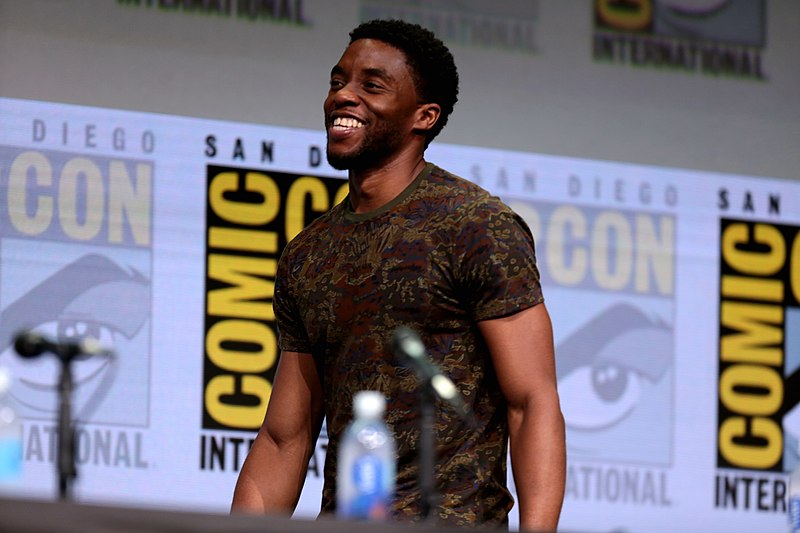On August 28, 2020 many were surprised and dismayed to hear about the passing of Chadwick Boseman, the actor perhaps best known for his portrayal of King T’Challa in Black Panther. Only a handful of close friends and family knew he was sick with colon cancer as he continued to work throughout his illness. Members of the U-C Comics Colloquium came together and submitted brief remembrances on his life and legacy.

Mara Thacker, South Asian Studies & Global Popular Culture Librarian
Death is a constant during a global pandemic. Hundreds of thousands of people all over the world have lost their lives in the last six months. After time, as some sort of psychological defense mechanism, one gets numb to the individuality of the tragedies. A stranger on Twitter posting about losing a beloved aunt or colleague hits with the same ferocity as the death of a famous singer or actor. But when I heard that Chadwick Boseman had died on August 28, 2020 it hit me differently. It’s not just that I loved his movies, though I did. It’s not just that he was a source of inspiration and aspiration for young Black people in America, though he was. It’s that in an age when many celebrities inspire cynicism for their lack of self-awareness and inane publicity stunts (even in the midst of said pandemic), Chadwick Boseman seems like he was genuinely a really gracious and kind person in addition to being an insanely talented actor. So I’m sad the world not only lost the movies he might have gone on to produce, but also lost a good person who inspired people and made the world a better place.
Mohit Gupta, Product Manager at the College of Media
“Death is what gives life meaning, to know your days are numbered, your time is short” – From the movie ‘Doctor Strange.’ Maybe no one else in MCU did justice to the said quote except Chadwick. Chadwick signed his MCU contract in 2014, got diagnosed with stage three colon cancer in 2016 when Captain America Civil War was released. When humans come to know about the inevitable, they tend to preserve what should continue as a legacy.
Tony Stark shielded himself through Iron Man suit. But the Wakanda soldiers not only preserved the African American heritage by wearing traditional clothes throughout but displayed Afrofuturistic vision. Precious heritage clothes blended with technology. Isn’t that futuristic?
Boseman once said in the interview published in LA Times, “Most African Americans have had a moment where they are like, ‘I know I am of African descent — but I do not have that connection.’ That is something that needs to be healed. That is something that’s broken and has to be made whole. That conflict within the movie, and the conflict between an African American and his African [counterpart], is one that has existed since colonialism and since slavery.”
He identified what needs to be fixed and fixed it.
JJ Pionke, Applied Health Sciences Librarian
What can one say about Chadwick Boseman? He was an amazing Black Panther. He brought joy to so many people of color, especially children, who finally saw a superhero that looked like them. With his death, we are all left poorer, even more so because he was disabled for the last several years of his life. Illness is disability.
There is a tendency to glorify a person with a disability who “heroically” continues on with their work. Within disability studies, we refer to this as inspiration porn. Comments about Boseman being so inspiring now that we all know he was in treatment for cancer, absolutely fall under inspiration porn. His outing as being disabled has caused a shockwave within many communities in terms of discussing not only disability in Hollywood, but Black representation of people with disabilities. His life and work, like the rest of us, was intersectional (disabled, Black, artist). Representation matters. Being able to see yourself reflected in Hollywood has been huge for people with disabilities who are people of color. Boseman’s legacy is that not only did he make amazing art, he also represented groups that have been on the margins of Hollywood for a long time: people of color and people with disabilities.
Robbie Vermillion, Office Support Specialist
Chadwick Boseman will most likely be remembered primarily as the star who brought T’Challa, the Black Panther to life for Marvel Studios’ film Black Panther. The Actor was 43 when he passed away from colon cancer which was kept personal and not disclosed to the studios while he was working. Chadwick was a frequent support for children who were also dealing with cancer as he knew his status as a superhero would bring some joy to them in their dire situations while he was also secretly dealing with his own cancer battle.
Boseman also played Jackie Robinson in the film 42, depicting the man who broke the color barrier in Baseball. He was also Thurgood Marshall in the film Marshall where he portrayed the first African American Supreme Court Justice. Portraying ground breaking roles and depicting strong black leaders was important to Boseman. Looking at the roles he took one can surmise that he wanted to do his part to honor people and characters that inspired him and further bring Black leaders into the limelight so often held by white men. His portrayal of fictional African king T’Challa of Wakanda in Black Panther was not only a strong performance of a proud black leader but also showcased the possibilities of what quality a superhero film could strive for and what types of roles people of color should be demanding and in demand for within Hollywood.
Cait Coker, Curator of Rare Books and Manuscripts
It’s not enough to say that Chadwick Boseman embodied King T’Challa of Wakanda. He embodied Black Excellence, and he embodied hopes and dreams for millions upon millions of fans, especially young children. I cried not just for the death of a brilliant young actor, but for the decades of art he should have lived to produce, and which leave us all the poorer for not having.
Spencer Keralis, Digital Humanities Librarian
Chadwick Boseman’s death is tragic and heartbreaking. The first thing I remember seeing Chadwick Boseman in was 42 in which he played legendary baseball player Jackie Robinson. I never watch sports, but I’m a total sucker for a sports movie, and I recall watching it and thinking what absolute star power Boseman had, and what depth and humanity he brought to the role. Years later, seeing fans on The Tonight Show sharing what the movie meant to them, then seeing Boseman’s graciousness to his fans was such a joyful experience, and speaks to the indelible legacy he leaves behind.
Shawn Gilmore, Senior Lecturer and Editor of The Vault of Culture
Chadwick Boseman will likely be best remembered for playing Black Panther in the Marvel Cinematic Universe, a role that he inhabited across a handful of films. While much should be said about Black Panther (dir. Ryan Coogler, 2018), I prefer to focus on the introduction of the character in Captain America: Civil War (dir. Anthony & Joe Russo, 2016). Civil War focuses on the Avengers in full force, attempting to be global peacekeepers, following the near-complete destruction of Sokovia in Avengers: Age of Ultron (dir. Joss Whedon, 2015). Civil War opens with the Avengers attempting to stop the heist of a biological weapon in Lagos, where they end up killing Wakandan humanitarian workers. This moves up the time table on the Sokovian Accords, a United Nations agreement to limit their activities, which are set to be signed in Vienna at a ceremony attended by King T’Chaka of Wakanda, a secretive African nation. An explosion rips through the ceremony, killing T’Chaka, setting his son, T’Challa (Black Panther) on a path of revenge, directed throughout the film at the Winter Soldier, a brainwashed Bucky Barnes, himself former (and still?) best friend of Steve Rogers/Captain America.
This setup only heightens the internal tensions within the Avengers, who are pitted against one another over a variety of pithy ideals about the use of power and allowing limits to be put on it. Meanwhile, T’Challa moves through the film alone, attempting to kill the Winter Soldier. Boseman’s performance is slow and solemn compared to the yelling matches between Robert Downey, Jr. as Tony Star/Iron Man and Chris Evans as Cap. He brings none of the quips and light jabs concealing the underlying differences now established within the team. As outsider, he looks on as the team falls apart, first fighting at the Leipzig airport, and final disintegrating under the revelation that the Winter Soldier killed Tony’s parents and that Cap had known this for some time. As the three “heroes” (Tony, Cap, Bucky) brawl, manipulated to near-mortal combat by the vengeful Helmut Zemo–whose family had been killed in Sokovia—T’Challa, putting down his Panther helmet, confronts Zemo (link): “Is this what you wanted, to see them rip each other apart?” Boseman remains out of focus behind Daniel Brühl’s Zemo, as Zemo lays out the trauma brought on by the Avenger’s glib approach to power: “If I could get them to kill each other…” Boseman, haunted: “Vengeance has consumed you. It is consuming them. I am done letting it consume me.” Denying the path of the Avengers, T’Challa stops Zemo from committing suicide while Tony and Cap rage in futile battle.
Boseman’s performance is understated in the face of the outlandish heights of superhero battles, careful and humane at the revelation of true pain as opposed to the cartoon playing out behind him. It is hard to imagine these lines and scenes playing out with another actor or them dragging the film so fully away from the spectacle we have come to expect. And yet, near the end of Civil War, there’s Chadwick Boseman, grounding the Marvel Cinematic Universe in the human, not the super.

